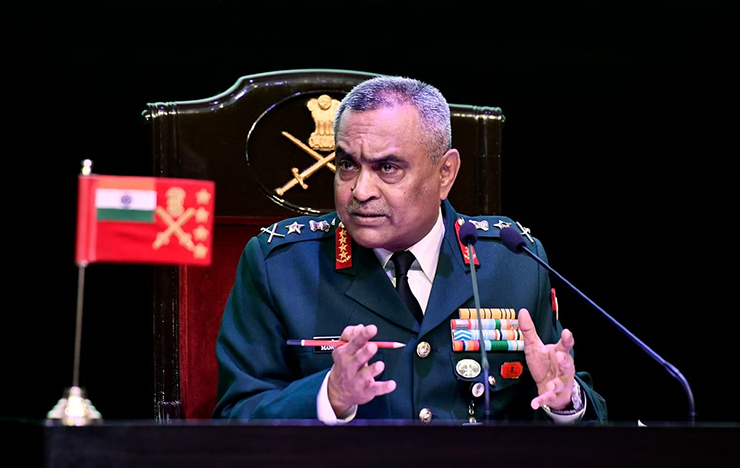
New Delhi: The Chief of Army Staff, General Manoj Pande, speaking at the annual press conference January 11 ahead of Army Day on January 15 said that the security situation on the northern border is stable but sensitive. India’s adversaries are playing an “active role” in aiding terrorists and terror-related activities in Jammu and Kashmir’s Rajouri and Poonch, he said.
Terming the situation in those two regions a “source of concern”, Army Chief General Manoj Pande said, “There was peace there till 2017/18 (but) this is now an area where our adversaries have been active. The situation on the northern border is stable but sensitive. We continue to talk to find a solution to address and balance issues between the two sides. Operational preparedness is very high, and deployment is both- robust, and balanced.”
He added, “As far as the situation in Jammu and Kashmir is concerned, the ceasefire understanding along the LoC continues to hold. Even though we see infiltration attempts, which we have been able to thwart… We have a strong anti-drone mechanism in place to stop the use of drones to smuggle weapons and narcotics…. The area of Rajouri Poonch has seen increased terrorist activities.”
“In terms of abetting terrorism and encouraging proxy tanzeems (proxies of known terror groups)… In the last three years, 45 terrorists were eliminated in this area. Last year alone there were five infiltration bids, which were foiled, and six terrorists were eliminated in those attempts. Even in the hinterland about 14 terrorists were neutralised,” the General said.
He shared a nine-point action plan to improve the situation in Rajouri, including enhanced intelligence gathering and better synergy with police and local security officials. The nine points outlined also include an emphasis on outreach to local populations and respect for human rights, both of which are crucial messages in the light of the death of three civilians after they were detained for questioning following a terror attack in Poonch that killed four soldiers.
Enhanced deployment and reorienting specific units, as well as human intelligence, and use of technology and instituting learnings from previous encounters are also key, the General said. The Army Chief’s comments come after multiple terror attacks in the Poonch and Rajouri areas, including an ambush of two military vehicles in the former district last month. The Pir Panjal region – Rajouri and Poonch districts – had been free from terrorism since 2003 but major attacks have resume since October 2021. In the last seven months alone, 20 soldiers, including officers and special forces commandos, have been killed. Last year, General Pande was in the region to review the operations, and also to firefight protests after three civilians were killed after they were detained for questioning.
Underlining that there will be zero tolerance for human rights violations by those in uniform, the Army Chief said, “My guidance to commanders and soldiers on the ground is, respect for human rights. There will be zero tolerance for action in that account and standard operating procedures have been clearly laid down. This is something that I have emphasised and reimposed. Our operations in those areas will continue in relentless fashion.” Referring to the village from where the civilians (three, among eight picked up by the Army for questioning in the aftermath of the Poonch ambush, were found dead last month) hailed, General Pande said, “We have already taken follow-up action. The affected village has been adopted by the Indian Army.”
On what India wants China to do militarily to end the stand-off in eastern Ladakh that is in its fourth year, Army chief Gen Manoj Pande underlined that the Indian Army is maintaining a “high state” of preparedness at all levels to deal with any challenge. “Currently our attempt is to continue with talks to go back to the status quo ante which existed in the middle of 2020. Once that happens, we can look at the larger issue of de-induction. First aim is to be achieved,” he said in response to a query on whether the Army still wants the Chinese to return to their positions as of April 2020 or if the situation on the ground is the new normal.
General Pande also said that with combined efforts of the State Govt, Army, Assam Rifles and other agencies we’ve been able to stabilise the situation to a large extent in Manipur. The state has witnessed violence since May last year.
Highlighting that disruptive technologies have become the new arena of strategic competition, General Manoj Pande said, “National interests remain paramount and the relevance of hard powers has been established… Disruptive technologies have become the new arena of strategic competition.” He also said that the Army has inducted better vehicles, drones and counter-drone systems.
“As part of emergency provisions, we have been able to induct some new technologies and address domains of warfare. We have inducted better vehicles, drones and counter-drone systems. We have terrain-specific electronic warfare systems.,” General Manoj Pande said.
Adding General Pande said, ”We have restructured our artillery unit. We also have restructured units of electronic warfare and electronic intelligence. We have started the process of reducing animals in our animal transport units and they are being replaced by drones…We have made a plan and optimise our strength by significant numbers and by 2027 we will achieve an optimisation of 1 lakh numbers. We have given the proposal to the government,” he added.















